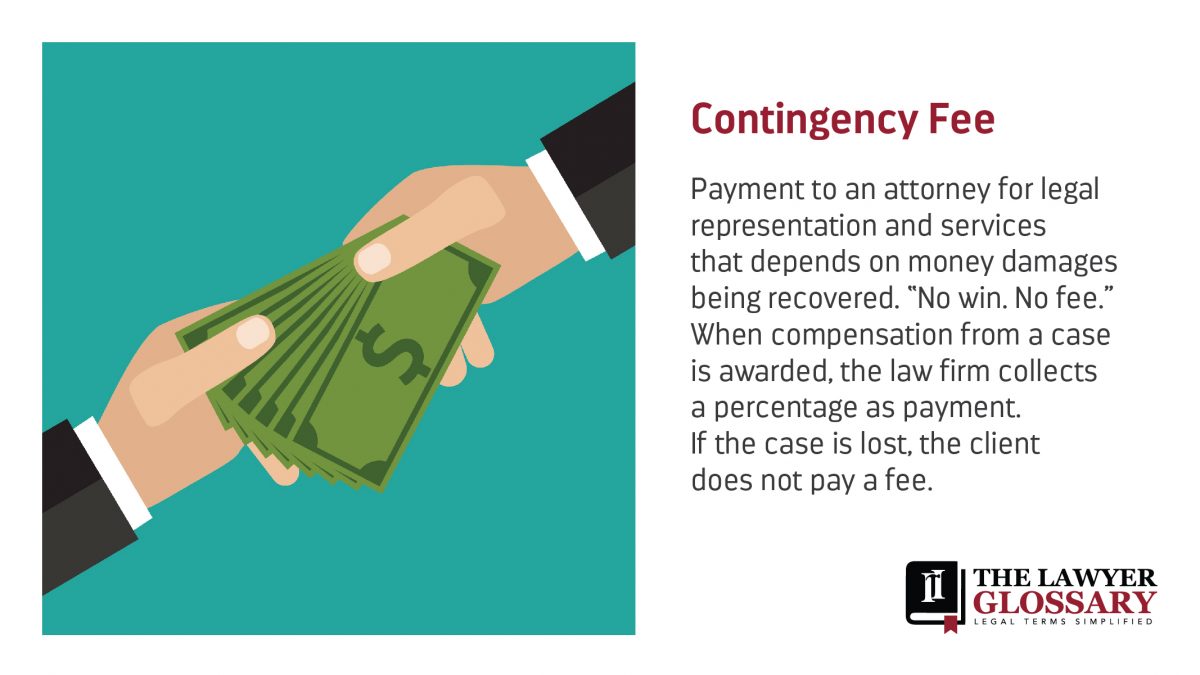
A contingency fee is a payment to an attorney for legal representation and services that depends on money damages being recovered. “No win. No fee.” When compensation from a case is awarded, the law firm collects a percentage as payment. If the case is lost, the client does not pay a fee.
A contingent fee agreement is commonly used in these types of cases:
Every state has laws in place which either allow for or prohibit the use of a contingency fee agreement. Criminal cases never allow contingency fees. In general, these cases also do not allow lawyer contingent fees:
The use of a contingency fee agreement is specific to Civil Law and is the preferred means of exchanging money for legal services in personal injury cases. The traditional means of paying an attorney is via hourly billing, a very different approach from contingency. According to Yale Law School:
“Most law firms make their money by billing their clients by the hour. In order to be profitable to your firm, you must make enough money from your billable hours not only to cover your salary and your overhead, but also to generate revenue for the firm. It’s not a complicated equation – the more hours you bill, the more revenue for the firm.”
All of this means that with traditional hourly billing, lawyers working on your case will keep a record of the time they spend on your claim. It can feel like a conflict if a law firm is not diligent with practicing transparency in how they work and record each hour needed for your case.
The main reason clients in personal injury cases choose a contingency fee arrangement when hiring a lawyer is for access to legal services without the large and ongoing up-front costs.
Personal Injury cases can involve millions of dollars. Some of the expenses typically fronted by lawyers that work on contingency may include:
When it’s all said and done, your case will hopefully result in money damages being collected in order to restore justice. With contingency, if there is not an award, the law firm does not collect a percentage from the client and the burden of costs for the case falls upon the attorney.
When there is a positive outcome and compensation is awarded, the industry standard for paying the law firm typically ranges between 33 percent and 50 percent of the awarded money damages, or between one third and one half. That means that the injured client can expect to receive between 50 percent and 66 percent of the financial recovery.
The percentage of compensation the law firm collects in a contingency arrangement will reimburse the law firm for time, resources, and expenses poured into the case in order to win a successful settlement or verdict.
Sharon and her family were seriously injured when a big rig truck slammed into their vehicle on the highway. She has missed work (and income), she was expecting a promotion, her medical bills are growing with a recent surgery, and the SUV she drives will need to be replaced. She calls a truck accident lawyer, gets a free case review and they decide to partner together on the case.
Sharon and her attorney sign a contingency contract containing terms in which the law firm will put forward all expenses for her case. Her lawyer estimates her financial recovery could be as much as $2 million and they will pursue that amount based on evidence of the case, the insurance policy limits of the trucking company, and added pain and suffering she and her family have endured.
Sharon and her trucking lawyer agree to a rate of 40 percent collection for the law firm. That means if the case is lost, she will owe nothing to reimburse lawyer for the expenses of the case — she will not pay any attorney fees, costs, or expenses.
If the case results in a favorable settlement, the attorney will receive 40 percent of the awarded compensation as a contingency fee, plus the reimbursement of costs and expenses associated with the case. 60 percent of the award, minus any fronted expenses and costs, will go to Sharon and her family.
Payment to her attorney is contingent upon victory, and rather than front court costs herself, Sharon signs the agreement. Her lawyer has now been “retained” to begin working on her case immediately. That work may include filing a legal complaint with the court clerk, officially opening her claim of wrongdoing against the trucker and trucking company. The law firm will now pour the needed time, money, and resources to win Sharon’s important financial award to restore justice and make her whole again in the eyes of the law.
“We work on contingency. If we don’t win your case, you don’t pay.”
Translation:
We use the contingency model of payment for our legal services. You will only pay us in victory. If we do not win your case, we will cover the expenses and you will owe us nothing.
“We can either bill you hourly or put you on a contingency agreement.”
Translation:
There are multiple billing options when hiring our law firm. If you’d like, we can bill you for each hour we work on your case, and we’ll track additional expenses we’ll need you to provide for in your case. The other option would be the contingency model, in which case we’ll settle the bill at the end of the case by collecting a percentage of the winnings, with the understanding that if we do not win, you will owe us nothing.
Original Source: https://www.isaacsandisaacs.com/glossary/contingency-fee
